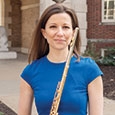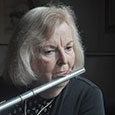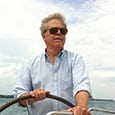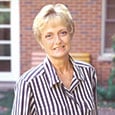Alice K. Dade, assistant professor of flute at the University of Missouri, enjoys a career of great variety. In addition to teaching she has performed as a soloist, chamber musician, and orchestral flutist both in the United States and around the world. She is now a recurring guest star of a new PBS series called Now Hear This hosted by her husband, Scott Yoo.
I was always trying to catch up with my older, more talented sister. She excelled at whatever she attempted and still does to this day. Ballet, soccer, math, writing, cooking, you name it. When I was nine, my mom noticed that I was getting frustrated since my first attempts at soccer and ballet were far below average. She suggested I try something my sister was not pursuing, like playing an instrument. I eventually chose the flute at my elementary school’s instrument trial night.
I started lessons with a college student at the University of Minnesota and eventually studied with Claudia Schnitker, who also directed flute ensembles at Edina Middle and High School. At our final lesson together, she gave me Renée Siebert’s recording of the Mozart Concerto for Flute in G Major, K. 313. We listened to the recording until my mom came to pick me up, and I remember starting to cry. My family was moving to Kentucky, and I was going to miss her. Luckily, I see her at NFA conventions each summer.
Are there musicians in your family?
While no one else is a musician, music was always around. As a family, we would play Name That Tune, singing melodies from some of our favorite Broadway musicals like My Fair Lady, Camelot, Funny Girl, and Oliver! My parents also had an impressive collection of CDs including Martha Argerich’s Chopin and Liszt Piano Concertos and Prokofiev’s Romeo and Juliet Orchestral Suite. It was usually my job to choose music to play while we ate dinner – served promptly at 7:00 p.m. when my Dad came home from work at the Air Force base.
Who were your early influences?
The year I started playing the flute, we lived in Edina, Minnesota. My mom thought it would be a good idea for us to go to a couple symphony concerts and consulted someone at Minnesota Orchestra ticket sales. We saw Henry Mancini conduct his film scores, Jean-Pierre Rampal perform concerti, and Victor Borge do his incredibly funny act. I was mesmerized. I also had no idea that these three artists would have such an impact on my life. Of course, all of Rampal’s recordings were in my CD library growing up, and I must have listened to Galway’s In The Pink album several hundred times. Victor Borge’s humor is what really struck me. Combining classical music with humor is something I have always wanted to do.
The first summer festival I attended was Sewanee Summer Music Center in Tennessee when I was fourteen. Eldred Spell was the flute teacher there. The most memorable moment of that summer was when Spell told our studio class it would be close to impossible to have a big career in classical music. I was so disappointed. That summer was the first time I felt I had a direction in life. I could not imagine doing anything else. I was so behind. I needed extra help with all of my chamber music and barely knew what time signatures meant. I told myself I would return to Sewanee the next summer a completely different flutist. I would learn my scales, listen to recordings, and start practicing every day.
The next summer Spell suggested I audition for his friend, Tyra Gilb, flute professor at the Interlochen Arts Academy. He helped me put together an audition tape and at the last minute, I decided to include a VHS of one of my chamber groups. I can’t remember which piece it was, but I do know we fell apart a couple of times. Later, Gilb told me that the tape was the reason she had accepted me. It was not good by any means, but it was clear I really wanted this. I returned to Sewanee for two more summers, as well as the Oberlin Institute with Michel Debost and Kathleen Chastain. After high school graduation, I attended the Aspen Music Festival and studied with Bonita Boyd. In college, I participated in a festival every summer. I was a member of the Russian-American Young Artist Orchestra, National Repertory Orchestra, Tanglewood, Sarasota Music Festival, and Schleswig Holstein.
Why did you choose Juilliard?
I think a big reason was that my teacher at Interlochen Arts Academy, Tyra Gilb, went to Juilliard. She is a beautiful flutist and had an answer for everything. Gilb also played Carol Wincenc’s recording of the Christopher Rouse Concerto for the flute studio during my junior year. For me, this was another lightning bolt moment: I wanted to play with that much expression. I wanted to study with Carol Wincenc at Juilliard.
How did you prepare for your Juilliard audition?
I had mononucleosis my senior year of high school and seemed to catch every cold and fever. Anytime something did not go well I thought to myself, “How am I going to get into Juilliard…?” However, without ever reading about mental toughness – something I would learn more about years later – I tried my best to block negative thoughts.
There were some mishaps leading up to my audition, of course. I had just purchased a used flute and was struggling to learn its tendencies. Gilb and I eventually discovered that the cork was wrapped in paper in order to stay in the headjoint! Once the cork was replaced, things got a lot easier. Gilb spent many hours with me, writing meticulous notes during each of my takes for prescreening. I especially remember recording the Nielsen Concerto, trying to bring out all of the detailed dynamics and characters.
Juilliard was my last audition of eight. I had a fever and not much of a voice but I didn’t care. I had been waiting for the chance to play for Jeanne Baxtresser, Julius Baker, and Carol Wincenc for so long. I focused on the music, especially the Gaubert Nocturne and Allegro Scherzando.
A month later, I received a letter saying I was wait-listed. Luckily, I was sitting sitting in Interlochen’s Cafeteria a month later, when someone approached me and told me I had a phone call. This was strange because one would usually receive a note in their mailbox in the event of a missed call. I asked them if they knew who it was and they said, “Juilliard.” I ran to the lobby of my dorm and spoke with admissions. I was accepted into Carol’s studio.
What was your Juilliard experience like?
I was so lucky to study with Carol Wincenc, Sandra Church, and Robert Langevin. They taught me that orchestral excerpts were like monologues, all with different contexts and a different cast of characters. They reminded me that I should only continue my pursuit in music if I had to do it. If I had any doubts, I needed to explore them. A life in music would not necessarily be an easy one. Seeing them perform on a regular basis was a big part of my artistic development at Juilliard.
All of the flutists at Juilliard got along very well. Going out for a big Korean dinner together and playing excerpts for each other was a normal weekend. We all sounded so different from one another. We also were supportive of each other. We went to concerts together regularly, including Emanuel Pahud’s 92nd Street Y recital, one of Wincenc’s performances of the Rouse Concerto, and Langevin’s Mozart Concerto for Flute in G Major with the New York Philharmonic.
I loved going to the opera whenever I had the chance. Seeing Mozart Nozze di Figaro at The Met made me realize how close flute playing was to singing. I loved going there whenever I had the chance. In my first lesson with Wincenc, she asked me to sing a phrase of music. I told her I was a little embarrassed, and she immediately said, “We’re going to be doing a lot of singing for the next four years!” In another lesson, I brought Villa-Lobos Bachianas Brazileiras No. 6. I was having a hard time figuring out how to interpret the second movement and was about to ask her for help when she started singing it. I took notes on what she was bringing out, what kind of rubato she used, and paid close attention to her vibrato. It was so inspiring. I will never forget it. I frequently ask my students to sing and have been known to sing pieces in our lessons. I think it is the only way to figure out how you really want to play a piece of music.
What did you do after Juilliard?
After graduate school at Juilliard, I moved to Miami Beach, where I was a fellow with the New World Symphony for three seasons. Like all fellows, I was taking orchestra auditions on a regular basis, but I was curious to take an audition overseas. I auditioned for principal flute of Bergen Philharmonic in Norway. In the final round, I performed excerpts with the orchestra. Even though I did not win the job, I was asked to perform as guest principal for a run of Tosca and a tour of Denmark and Germany performing Stravinsky’s Rite of Spring.
After my month in Norway, I performed with the Swedish Radio Symphony Orchestra as guest co-principal flute for two weeks, playing Strauss’s Salome and Rachmaninov’s Symphonic Dances. This led to a long-term contract as acting co-principal, performing on weekly radio broadcasts and several television broadcasts. I even made a small appearance on a children’s tv show called Bolibompa.
I was part of two recording projects in Sweden, both with singers. The first, Bad Boys, was with Bryn Terfel and the Swedish Radio on Deutsche Grammophon. I will never forget when Terfel’s friend, Anne-Sophie von Otter, arrived at the recording session to sing a duet with him. I was star struck, as one of my favorite recordings in college was her rendition of Schumann’s Frauenliebe und Leben. The second recording was with Barbara Hendricks and the Swedish Chamber Ensemble, released on Arte Verum. Her Mimi in Bohème remains one of my favorites.
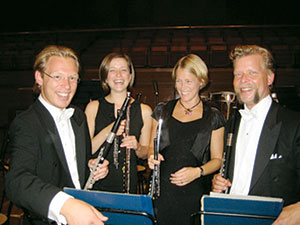
I just loved it. My commute to the concert hall, Berwaldhallen, was by train and bus. The view outside the bus window was so memorable – looking at the sea, a strange dim light, and unfamiliar stops announced in Swedish. I always arrived at work in the best mood because of it. I made friends and got to play with conductors like Rafael Frübeck de Burgos, Esa-Pekka Salonen, and Herbert Blomstedt. Rehearsals were usually in Swedish, which could be difficult. Sometimes it is hard to tell if someone is saying seven or twenty, especially when the Finnish conductors would speak Swedish. There were also numerous cultural differences, which led to interesting international moments. One sticks out in particular. Once we were rehearsing Copland’s Rodeo. Clearly no one had heard it before because there were no yee-haws in Hoe-down. It felt so empty. I gathered my courage and approached the conductor and explained the tradition, holding back my first bout of homesickness. I demonstrated to the orchestra where to do this and how. I got strange looks but was determined to share this little American moment with my new friends. At the concert, everyone blurted out a sort of short yawp. The sweet thing was that several members smiled at me afterwards, asking if it was okay.

What led you to return to the U.S. and become a professor?
I could have stayed in Sweden and in fact considered it for a while, but I was beginning to think the orchestral life was not exactly what I was meant to do. I moved to Chicago and lived there for about a year, teaching adjunct at Sherwood Community Music at Columbia College Chicago and freelancing with the Detroit, St. Louis, and Oregon symphonies. It was then that I got a call from my friend Scott Yoo who suggested I apply to a position in academia. What is strange is that not an hour before his phone call, I was making a bubble chart and brainstorming about what I wanted in my professional life. I wanted teaching, chamber music, solo recitals, a recording project, writing articles, and combining comedy with classical music. I applied for two jobs by the end of the week.
After a live audition for the position at the University of Missouri, I knew this was the path I wanted to take. There seemed to be so many possibilities in a career like this. I had a similar feeling after my first summer at Sewanee; I had finally found other people who had similar goals and interests. A career in academia made sense and it was exciting. I have found my niche in terms of my main job. Since I started teaching at Missouri, I also have been busy performing concerti and chamber music, presenting masterclasses, and writing. It is exactly what I wanted. It made me realize that figuring out specific goals and wants is key.
What is your teaching philosophy?
Every student is different. When explaining something, I try to have several options to offer the student, as well as a demonstration and specific instructions. I have found that some students need help learning how to practice. Time management is a big topic with my students as I have quite a few double majors.
I also want my students to be employable. Therefore, they need to play well and be entrepreneurs. I talk about resumes, writing articles, running a private studio, designing a website, and many things other than flute playing in our studio class. We live in an exciting time in classical music but it is different from the days when musicians could just practice, go home, sleep, rinse and repeat.
Sometimes my students need encouragement and sometimes they need the talk. I do my best to gauge which one will give them energy and inspiration.
Why do you like teaching?
Because flute playing did not always come naturally to me, I understand the struggles my students are facing and enjoy finding the right words to describe how to approach problems. When I starting going to Interlochen, I felt behind in terms of technique, rhythm, and – well, everything. I had to spend a lot of time experimenting in the practice room, trying to figure out how someone was able to play such a beautiful pianissimo or how playing the Saint-Saëns Carnival of the Animals excerpt could sound so effortless.
I understand the struggles my students are facing and enjoy finding the right words to describe how to approach problems. In a way, I am grateful that things did not come easily to me. I can help students go to the lab and figure out why their right hand has pain or why their sound is covered. I like helping them solve problems.
I also enjoy helping students achieve their goals. This can include figuring out what motivates them, what needs tweaking in their practice schedule, and general time management. When I figured out what you do every day is much more important than what you do sometimes, I started practicing the most difficult passages consistently. This always makes a successful concert happen. I wish I had known this as a student.
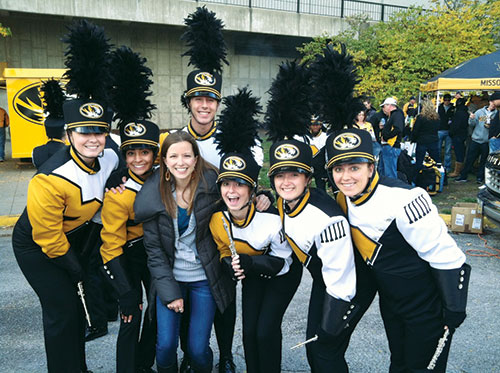
Posing with flute students of Marching Mizzou
What advice would you give someone who is just starting out?
Don’t focus on winning a job. Focus on practicing and continuing to grow as a musician. That is when good things will happen. When I was at New World Symphony, there was an email sent out to everyone in the orchestra whenever someone got a job. I became obsessed with winning a job. I practiced my excerpts constantly and was probably in the best shape of my life. I then played an audition list for Michael Tilson Thomas. Two or three excerpts in, a man named Harry Shapiro, a horn player who had performed in the world premiere of Bartók’s Concerto for Orchestra, stood up and said, “Some people get it and some people don’t. You, you don’t get it.” He left the hall.
One of my next assignments at New World was performing Beethoven’s Serenade, op. 25. Paula Robison was our chamber coach. It was my first week of trying to get back on track, focusing on the music and forgetting about winning a job or trying to impress someone. I learned so much that week. To this day, I often check to make sure I am listening to criticism and compliments.
Make sure musicianship is in every step of your artistic process. Don’t allow technical passages or even slow practice to stop the direction of a phrase. Never allow the flute to dictate how you play.
As you interview for your first job, your answer should always be yes. Would you be willing to teach a theory class? You may need to teach clarinet lessons. Are you okay with that? Would you be interested in trying that? Always yes. You never know what you will learn, and your first teaching job will most likely not be what you imagined. That does not mean it will not be fulfilling.
Sleep, eating well, and exercise are incredibly important as you try and reach your goals in music. Be nice to yourself and ignore the negative talk in your head. Read James E. Loehr’s book The New Toughness Training for Sports.
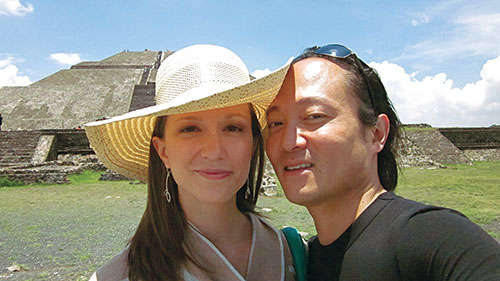
A PBS television producer, Harry Lynch, attended one of the sessions and approached Scott about doing a television show, and Now Hear This was born. A year later, Scott filmed the pilot episode in Italy about Antonio Vivaldi’s The Four Seasons. The format of the show is similar to those of the late Anthony Bourdain. Instead of food, it is classical music mixed with a little travel, culture, and some comedic moments.
I appear on the second episode, which explores the dance music of J.S. Bach. We filmed all over Germany and France, complete with period costumes and other guest stars, including Christoph Wolff, author of Johann Sebastian Bach: The Learned Musician. I have been asked to guest host an episode about the history of the flute for the second season.
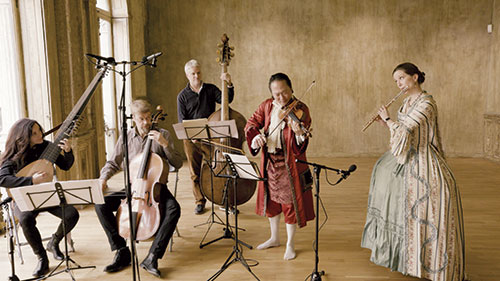
What was it like filming a TV show?
Scott and I are not actors, so the producer planted a lot of unexpected plot twists during the shoot in order to capture our natural reactions. Days are long and meticulously planned. We woke up early and often did not return until late at night. Because we were constantly changing locations, we traveled with a small crew of two cinematographers, the audio engineer, and editor, the line director, and the director. At each location, we were given a basic idea of where the scene should go, but there were no lines to be memorized.
Filming the show was very exciting, but I will never forget changing into a period costume in an unheated warehouse in Paris in the middle of winter. I quickly learned that smiling and speaking with a lot of energy were very important. At the same time, I had to avoid something that resembled the staged acting of people on house buying shows, “I just love this walk-in closet. And look at that crown molding!”
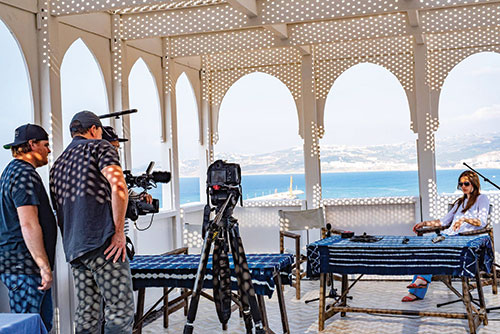
Filming episode #103 of Now Hear This in Tangier, Morocco
Solo Performances
As a soloist, Dade is an award winner of the Olga Koussevitsky Wind Competition of the Musicians Club of New York and The New York Flute Club Competition. She has performed with the Guanajuato Symphony Orchestra (Mexico), Orquesta Sinfónica Juvenil Red de Escuelas de Música de Medellín (Colombia), PRIZM Festival Orchestra, and the Festival Mozaic Orchestra.
Chamber and Recordings
As a chamber musician she has performed at the Busan One Asia Festival, Chestnut Hill Chamber Series, Concordia Chamber Players at The Princeton Festival, Summerfest of Kansas City, and National Flute Association Conventions. Previously she was acting co-principal flute of the Swedish Radio Symphony Orchestra. She performed in concert tours to Russia, Germany, Italy, Belgium, and throughout Sweden and recorded with them on the Deutsche Grammophon label. Her first solo album, Living Music, was recorded at Skywalker sound and released in February 2018.
Orchestral
She has also performed as guest principal flute with the Bergen Philharmonic, Norrköping Symphony Orchestra, and Seoul Philharmonic, as well as guest piccolo with the St. Louis Symphony. In addition, she has performed with the Moscow Chamber Orchestra, New York Philharmonic, Los Angeles Philharmonic, and Detroit Symphony Orchestra.
Teaching
As a teacher she has presented masterclasses at Inje University (South Korea), The University of Guanajuato (Mexico), Vander-bilt University, Penn State University, and The University of Kentucky. She has been a faculty member of PRIZM International Chamber Music Festival, Flutes by the Sea Masterclass, and Medellín Festicamara.
Writing
She is a columnist for the Chicago Flute Club’s quarterly Pipeline Newsletter and has been published in Flute Talk, The Instrumentalist, and
